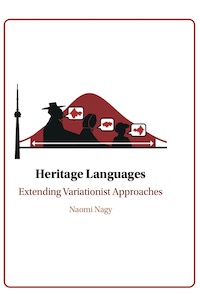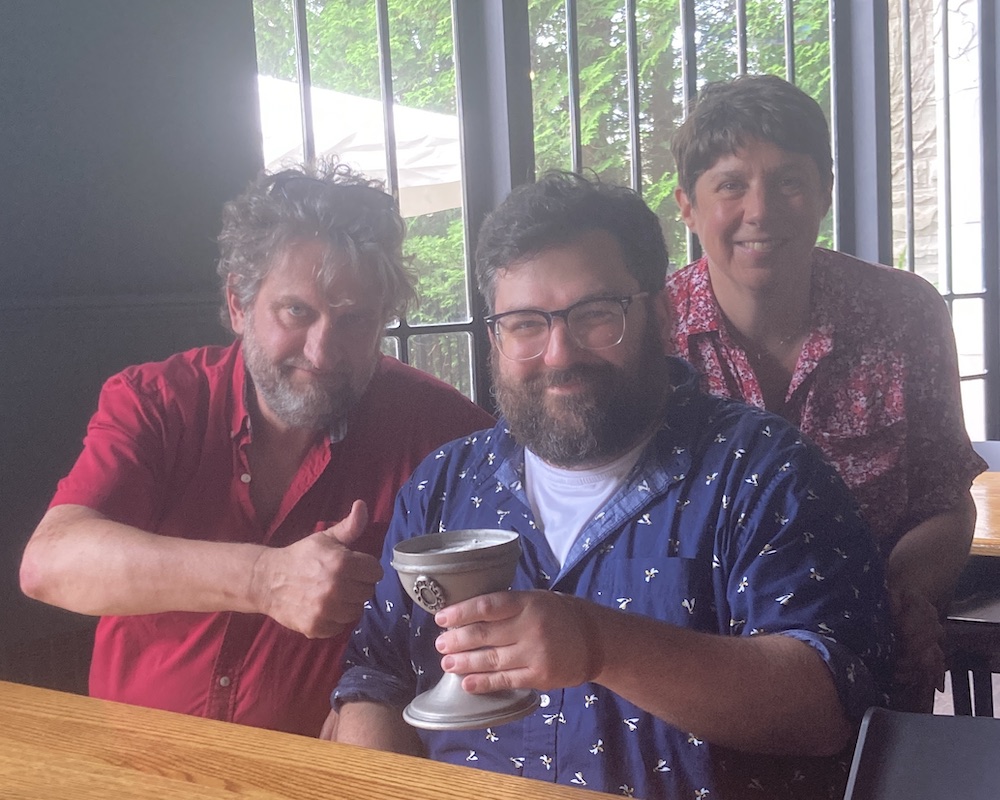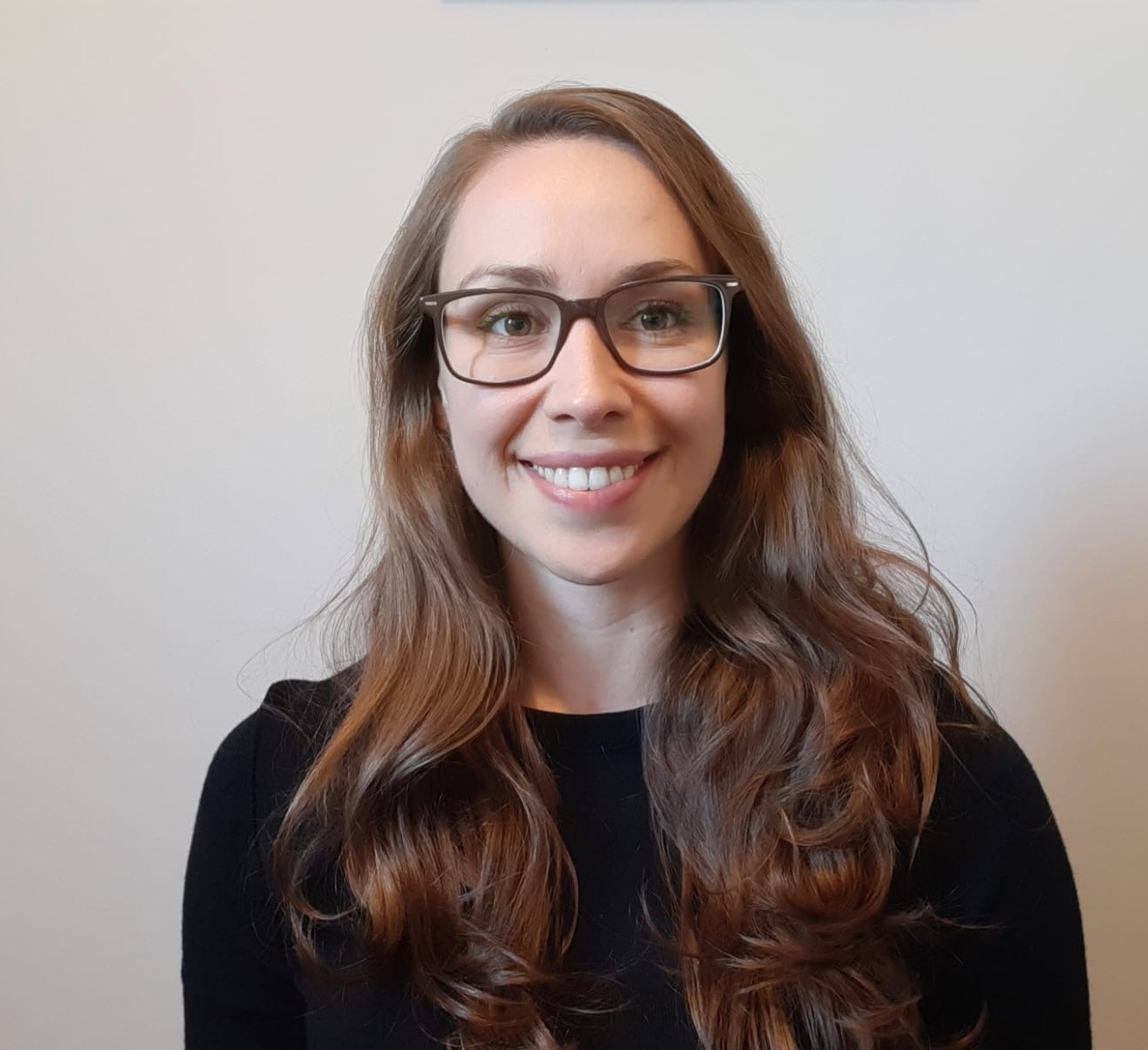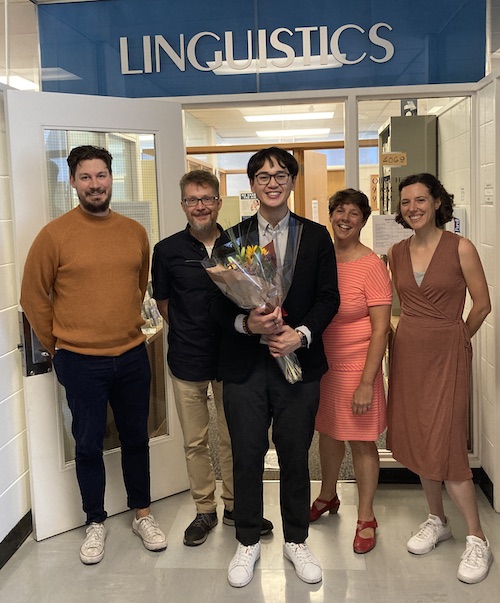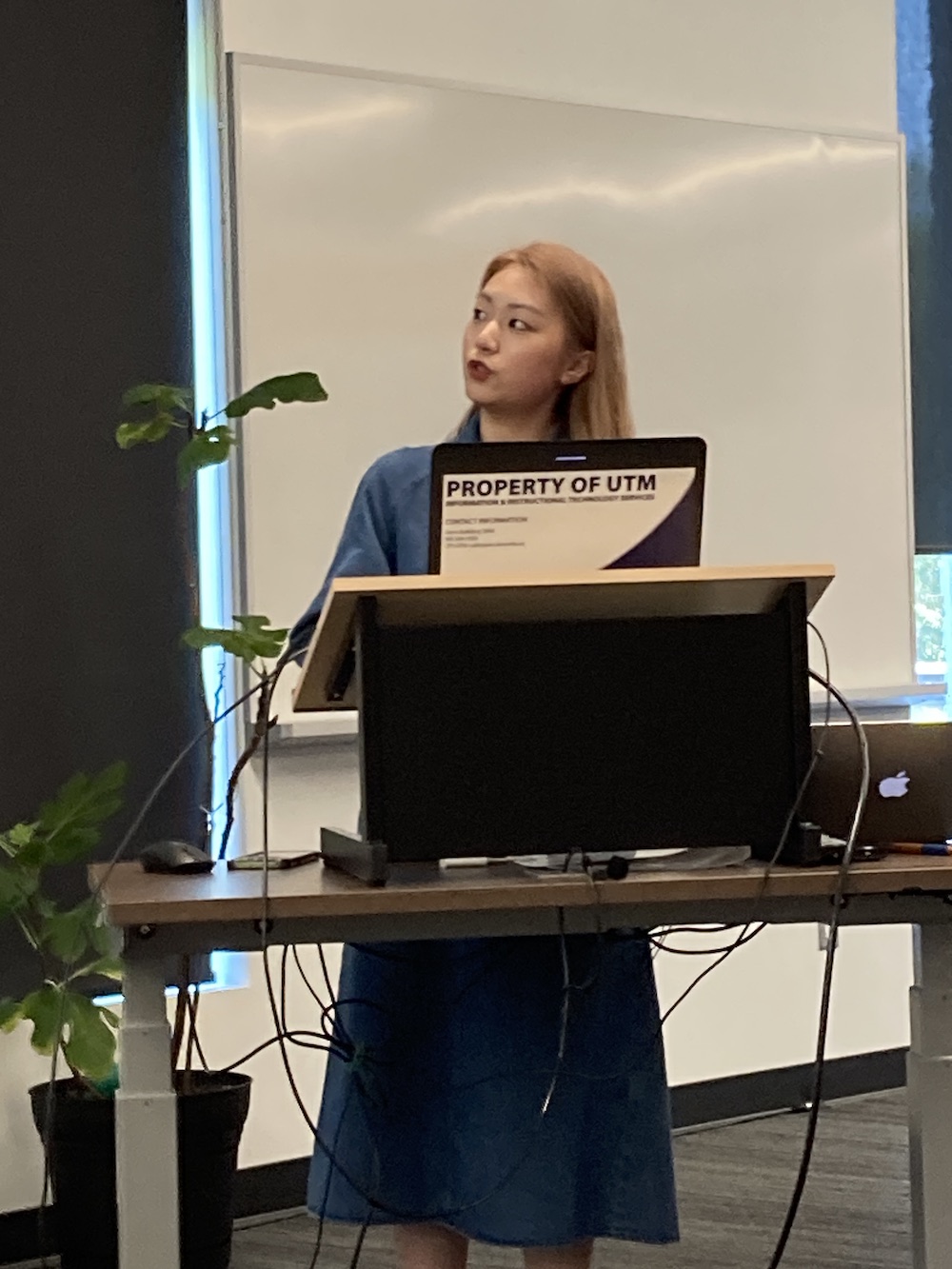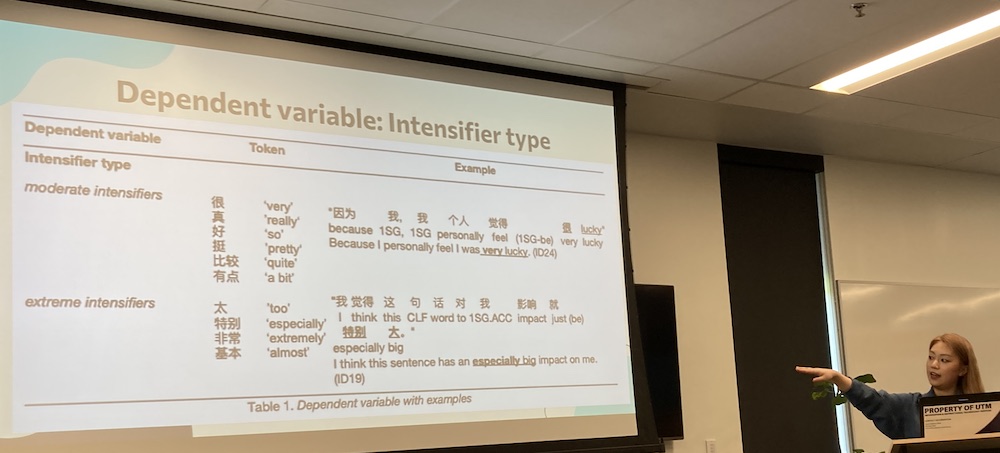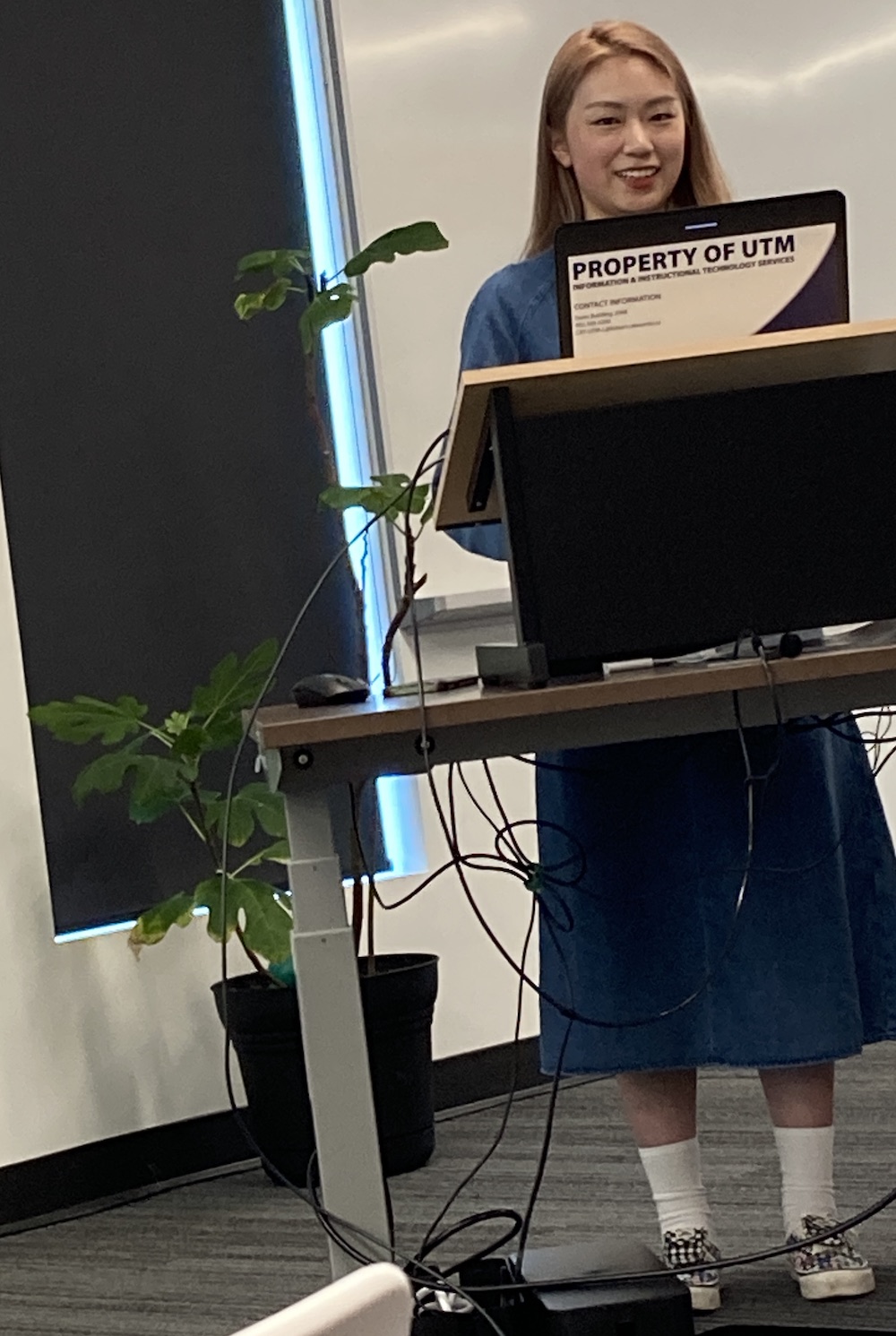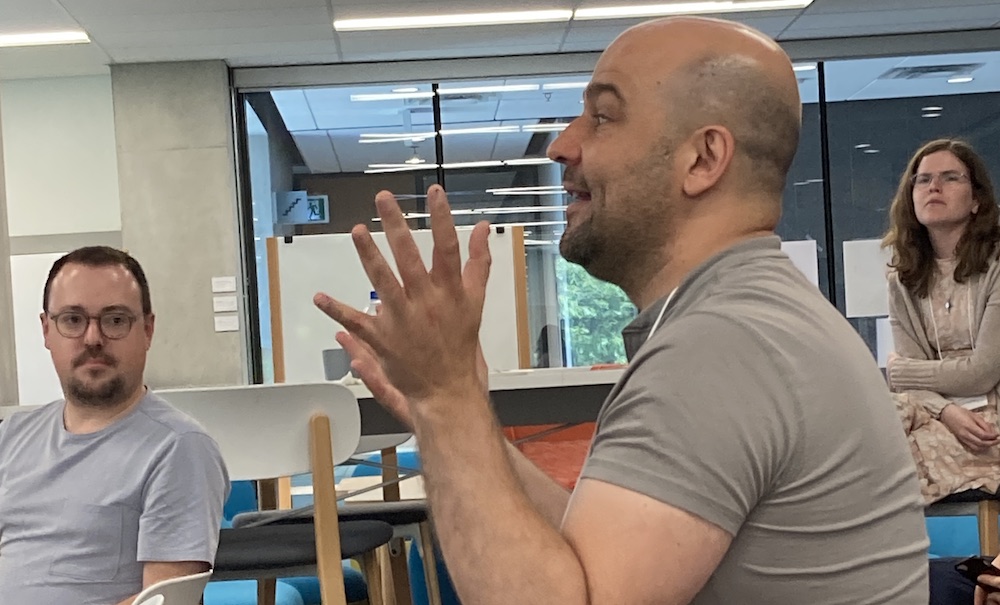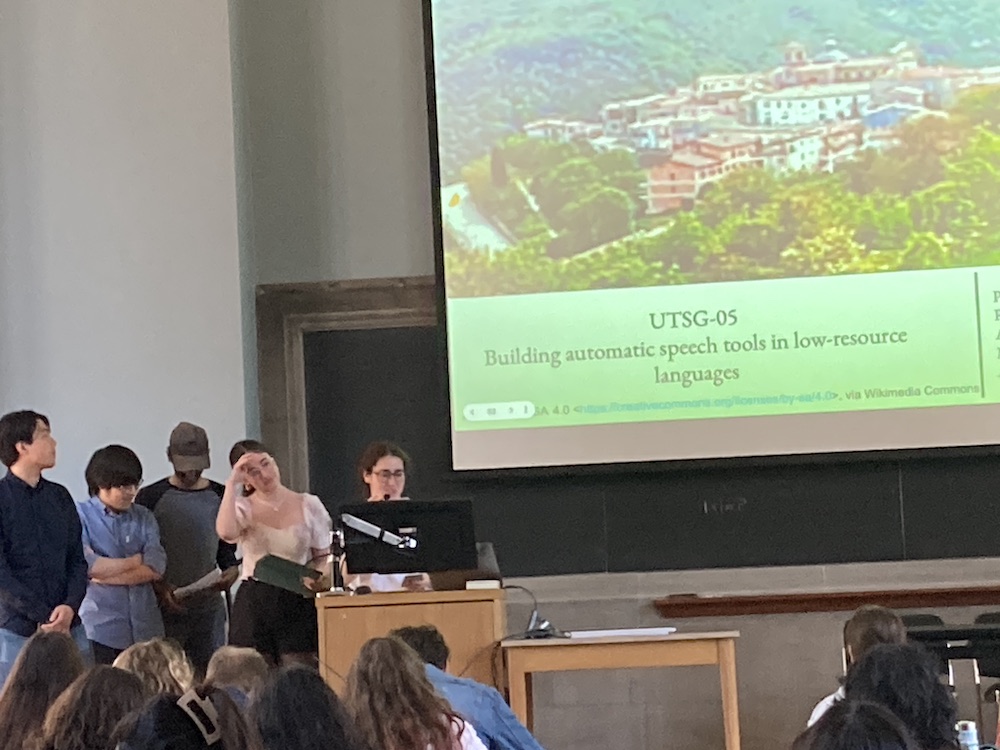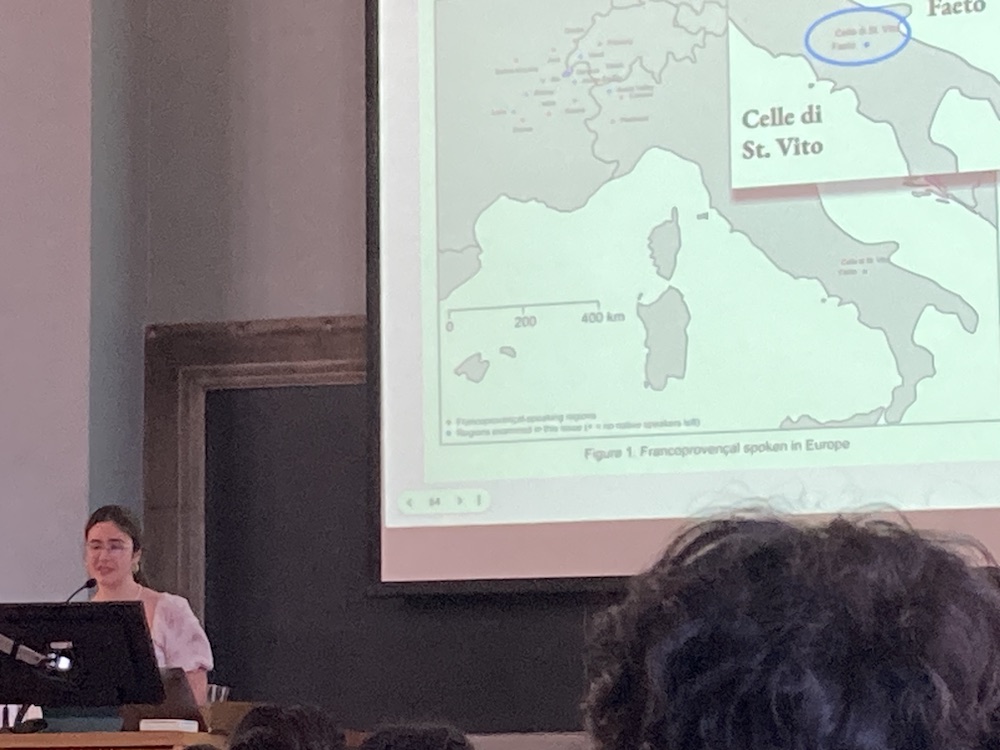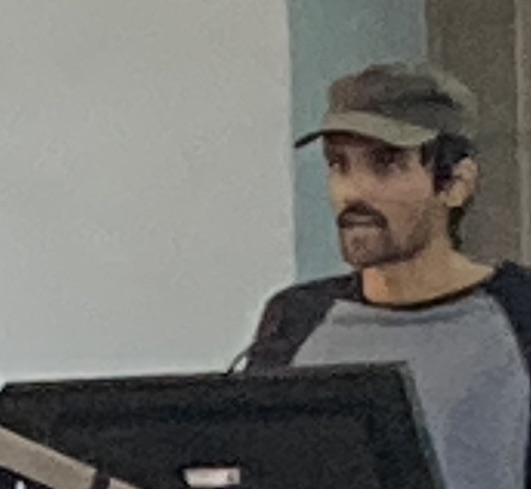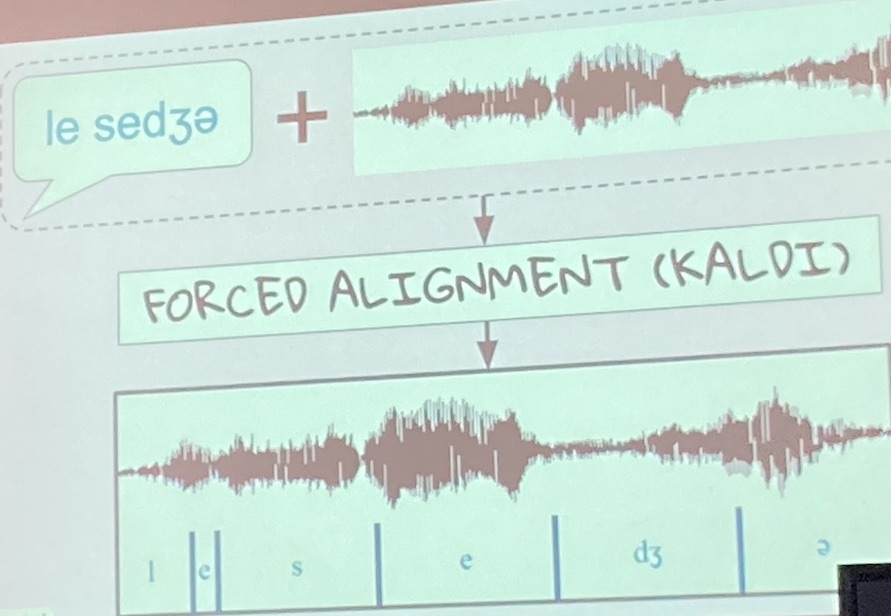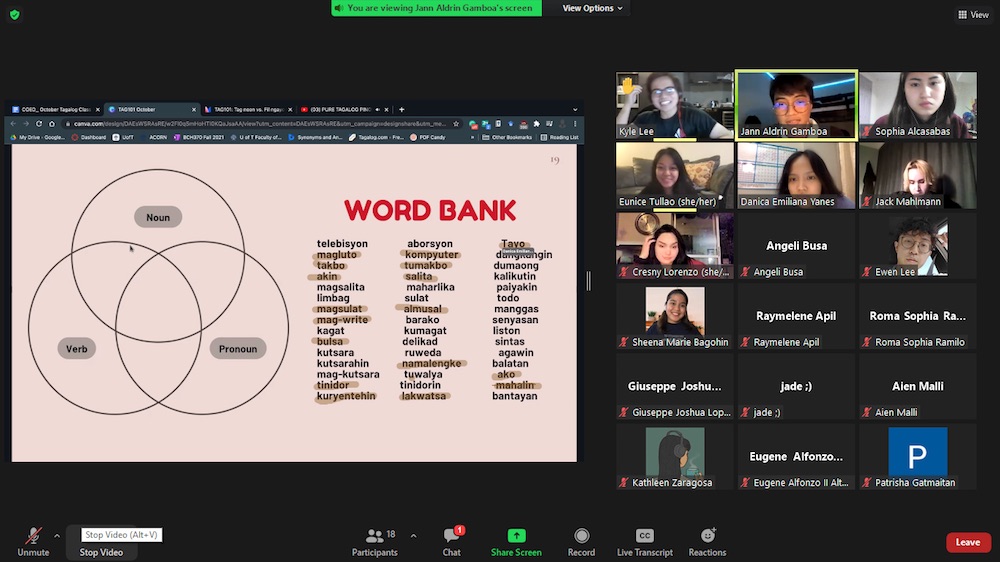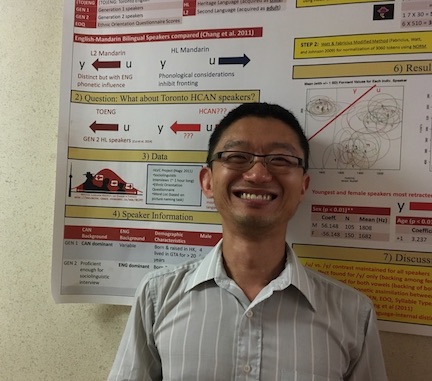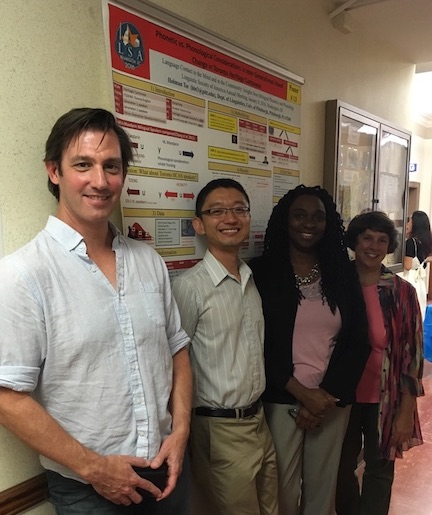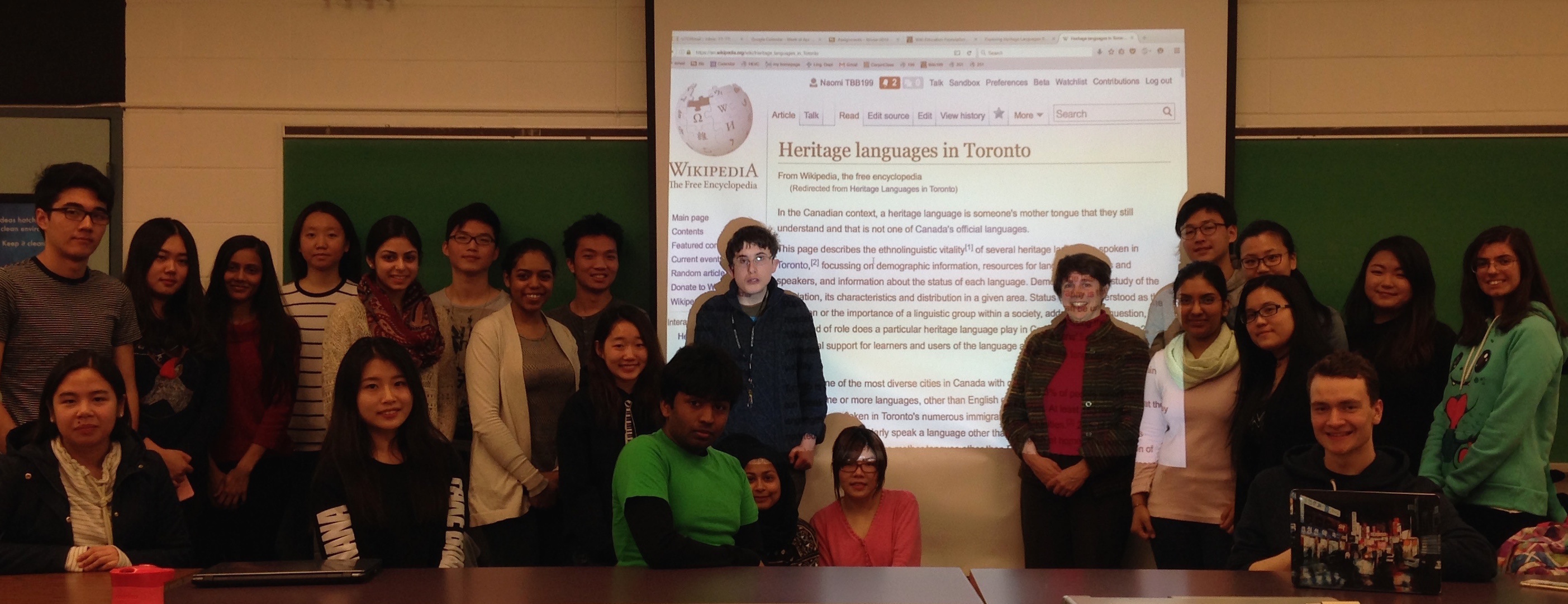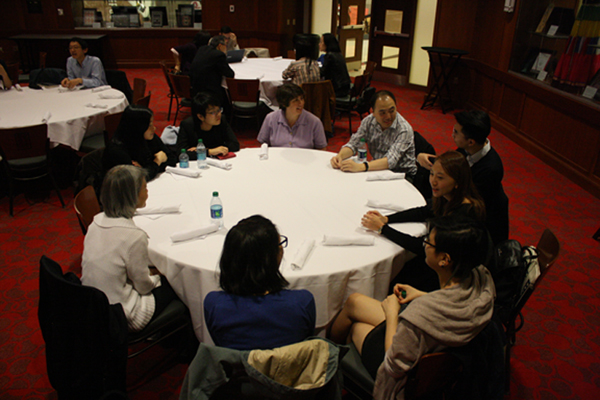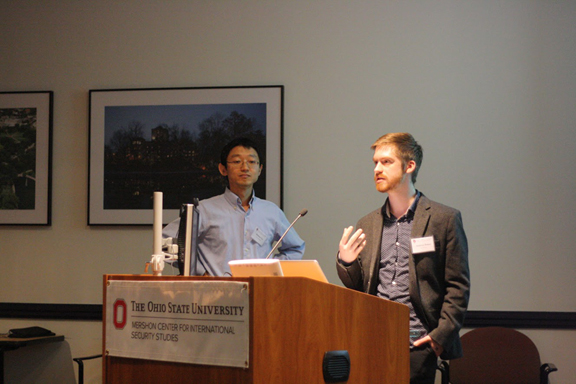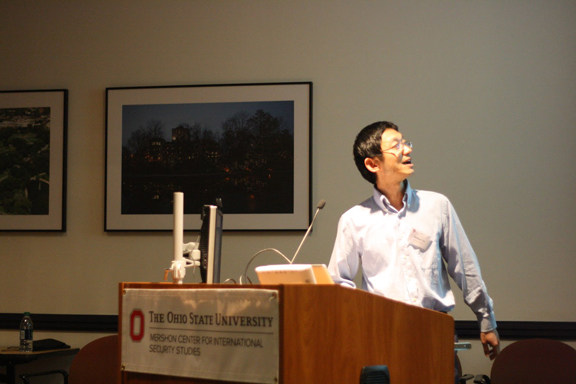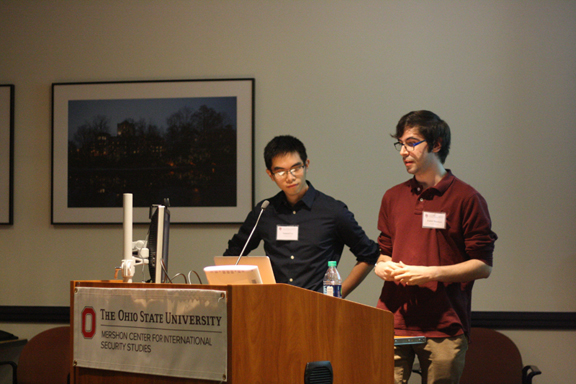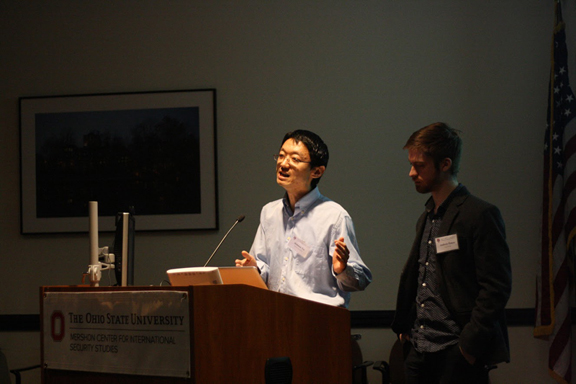If your community organization is interested in hearing about our work, please contact one of the investigators.
HLVC News
Post-doc Hilary, PI Naomi, RA Lauretta, and former RA (and recent MA grad!) Kathleen meet for an intense discuss about intersections of ethnic orientation and outreach activities, fueled by the great treats at Augusta Coffee.

The HLVC team enjoyed their annual end-of-summer check-in with perfect weather and great discussion about what it means to speak more than 1 language (cf. Kirk 2023). We were delighted to be joined by Samantha Jackson, Pedro Mateo and Samuel Akinbo. [22 August 2025]

Cantonese RA reunion and Jazz Festival | |
| Bonita Sham, Ariel Yeung, Craig Diegel and Naomi enjoyed some jazz and ice cream at the
Toronto Jazz Festival. Bonita was a MITACS summer RA in 2022 (Flashback). The 3 of us quickly found that our jazz tastes align well! |
 |
Italian/Calabrese identity and #FPGlobal presented at International Conference on New Issues in Language Contact StudiesSee our poster titles & details | |
Costanza and Naomi at the Poster session in a church  |
Celebration after  |
Montepulciano d'ABRUZZO  |
Costanza even got to talk with a Calabrese  |
HLVC Community Outreach Event
On November 9, 2024, the HLVC project delivered a community outreach presentation at the St. Jame’s Town Community Corner. Presenters were Chengbin Zhou and Maria Ramizo, who are Cantonese-
and Tagalog-speaking student research assistants, respectively. Materials and equipment are provided in conjunction with Progress Place, a not-for-profit social work organization based in Toronto. The eight participants included eight participants, Jamaican patois, Italian, Marathi, Russian and Tamil heritage speakers.
Chengbin began by providing an overview of heritage language to the seniors. To the team’s surprise, most seniors already speak a heritage language or understand the importance of preserving one’s heritage. There are also participants who confronted the speakers with a more pragmatic stance - they think that heritage language preservation should not be prioritized over the teaching of English. There were debates over how to promote a heritage language among the seniors in good faith.
Then, Chengbin introduced a case study of Cantonese classifiers, which shattered the stereotypes of heritage speakers. Using “a bottle of water” as an analogy of classifiers in English, the team explained that there are many classifiers used in Cantonese, and a heritage speaker is likely to be judged by their use of the “canonical” classifier. Contrary to common belief, the heritage speakers of Cantonese actually used classifiers more accurately than the homeland speakers. Upon learning this, the participants were quick to reflect that we should not pre-judge heritage speakers.
Then, Maria began our Bingo game. Pairs of seniors sitting together were given worksheets describing 19 real-life scenarios. For each, seniors were invited to mark what language they use: English, their native/heritage language, or a mixture of both. The pair with the most similar responses wins.
In the end, everyone reflected on their language choice and gave a rationale for using the language. Several trends were identified. For instance, many use English more when dealing with professional or technological terms, and most use their native/heritage language when chatting with a bilingual friend or their distant relatives.
Everyone who came to the table brought a fresh perspective. We truly believe community outreach events are a great way to give back, and planning for more similar events are underway!
... in the same week as we had a poster about Calabrian Italian VOT at the AISV conference! Heritage Languages: Extending Variationist Approaches [Order from Cambridge University Press] summarizes methods, motivations and findings from over a decade of work by the HLVC Team. See the Abstract and Table of Contents.
We had a book launch party on 29 September 2024 at the Canadian Language Museum -- see this write-up! The imbalanced interaction of verbal ambiguity and pro-drop: That's the title of the second ever dissertation based on HLVC materials, as well as data from his family's community of Ciociaro speakers in Sarnia. It was successfully defended on June 25, 2024, at the University of Western Ontario's Department of French Studies. Michael also gave a public lecture on the topic on the same day. It was exciting -- the power went out, but he persevered. Co-supervisors: David Heap & Naomi Nagy. (You can see other student papers using HLVC data here.) Congratulations et félicitations, Michael!! Our newest team member is Project Manager Hilary Walton. She will be organizing, managing, helping and keeping things running smoothly for the HLVC Project. Read a bit more about her, also here. An alum of our Department, Marina Sherina-Lieber [marina dot lieber at gmail dot com] writes: if you know any graduate students in the department who would be interested in teaching their language as a heritage language to kids (including Russian), starting in the fall (2024), it would be great if you could refer them to me. Especially those interested in heritage languages, bilingualism, language acquisition.
The HLVC Project has a custom-designed conference: NWAV 51 at Queens College (NYC) with the theme: Variation in the World’s Languages! HLVC members gave 6 talks:
Pocholo Umbal successfully defended his dissertation, A comparative variationist analysis of phonetic variation and change in Toronto Heritage Tagalog, on 28 August 2023. Watch for it to appear soon in T-space].Congratulations, Pocholo, on producing the 2nd dissertation in the HLVC project!! Understanding emotions in intercultural medical settingsShiyang Sun gave a talk at the CVC conference, "Understanding emotions in intercultural medical settings: A quantitative analysis of adjective intensifiers in Mandarin serious illness conversation in North America." She aced it and got great feedback. (June 2023)
Faetar gets force-aligned!A dedicated team of Jackman Scholars in Residence (SiRs), under the guidance of Sean Robertson and Ewan Dunbar, organized piles and piles of old and dilapidated transcripts and recordings of Faetar and produce a modern technological feat - force-alignment of transcripts to their corresponding audio files. They presented this work at the SiRs Research Forum (May 2023). Here's a selection of photos:
Technical detail: Miracle accomplished with the help of an ASR system trained using Kaldi (Povey et al., 2011) The SiRs team: Paula Arkhangorodsky, Robin Huo, Alba Jorquera Jimenez de Aberasturi, Michael Ong, Aman Sakhardande Chinese languages at the museum!The newest exhibit at the Canadian Language Museum is all about Chinese languages in Canada. HLVC people were involved. Check it out! Holman wins St. Kate Writing PrizeHolman Tse, Assistant Professor at St. Catherine University, St. Paul, MN, has won the Eleanor McCahill Denny Prize for Distinction in Writing in the Scholarly Category in 2023 for his paper, “What Can Cantonese heritage speakers tell us about age of acquisition, linguistic dominance, and sociophonetic variation?” [In Bayley, Robert; Preston, Dennis and Xiaoshi Li (eds). Variation in Second and Heritage Languages: Crosslinguistic Perspectives, pp. 97-126. John Benjamins. DOI: 10.1075/silv.28.05tse]This Prize recognizes the highest quality of writing among St. Catherine University’s faculty and staff. Congratulations, Holman! A satisfied workstudy student reports in
Dim sum lessonBonita taught us all how to serve, eat and enjoy dim sum at Rosewood. 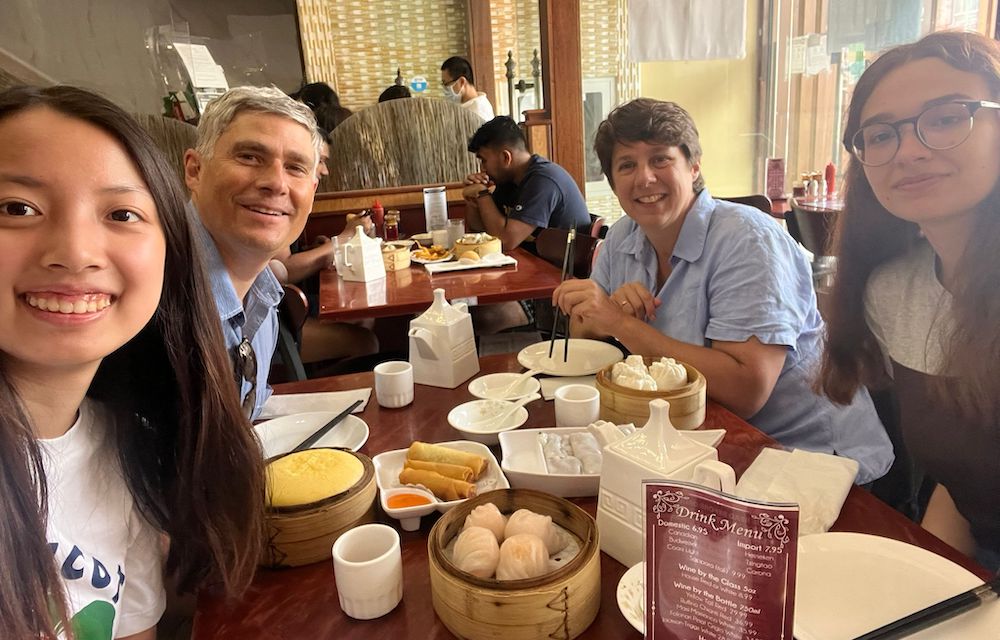
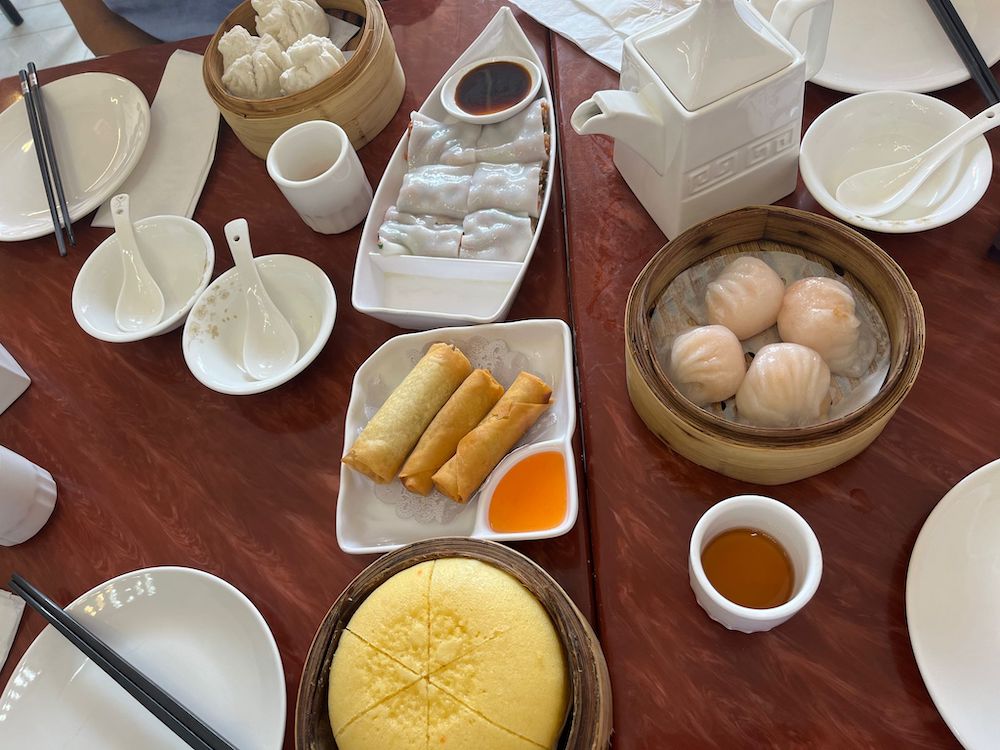
Then we toured Kensington Market and enjoyed cheese at the Cheese Boutique. Bulgarian kashkaval was as close to a Ukrainian cheese as they could offer. (August 2022) Lab LunchResearchers in the HLVC had a lively discussion with Professor Jim Stanford, a sociolinguist at Dartmouth College. 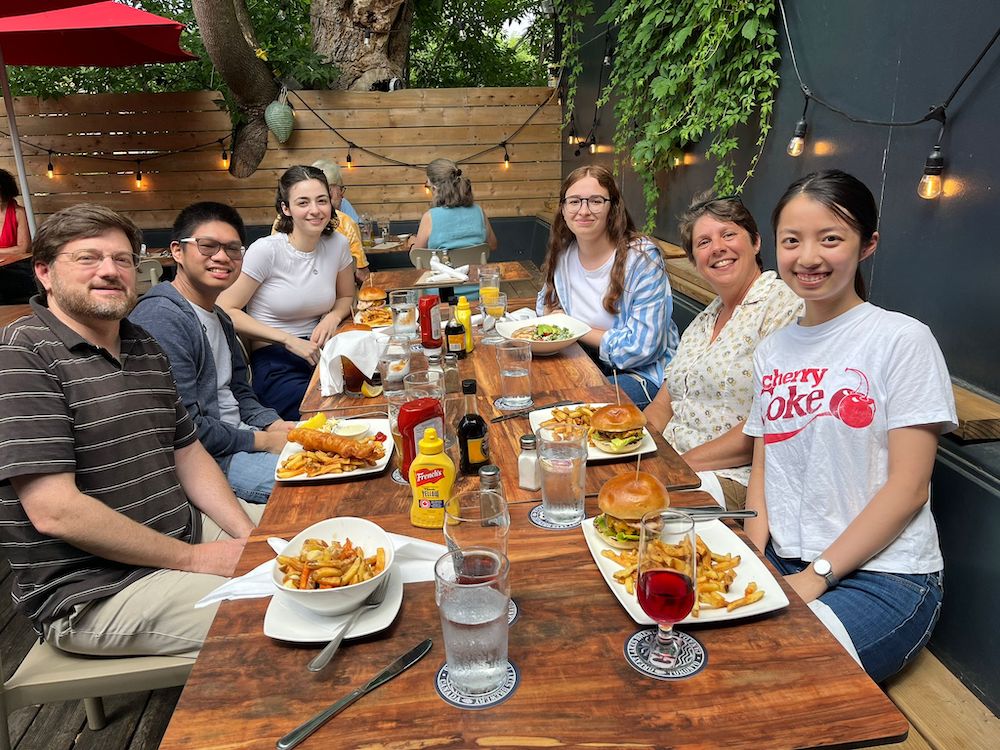
Jim, Justin, Julia, Olha, Naomi & Bonita; Photo credit: Craig Diegel Naomi quickly describes her research en français on a beautiful spring day à Paris (April 2022).Final spring push for interviewing!!The University has announced "Approved face-to-face (F2F) human participant research may resume, provided researchers follow the special masking, COVID-19 testing, and Protocol approvals and amendments guidelines." (March 2022) Heritage language Zoom lecture by Dr. Maria PolinskyLecture by Maria Polinsky: March 9, 3pm Central Time [4pm in Toronto], 2022 Contact Naomi for the Zoom link! FSAT Collab
Michael Iannozzi, a former Faetar RA, now working on his dissertation about variation in the Ciociaro dialect, took some time to tell people, via https://www.ctvnews.ca, about pandemic-related language change. Paulina Łyskawa, who earned her BA (2014) and MA (2015) in our Department, successfully defended her PhD dissertation, Coordination without grammar-internal feature resolution, at the University of Maryland on Jan. 15, 2021. One of her committee members reports in. Congrats Paulina!!
Pocholo Umbal won the LSA's Elizabeth Dayton Award, an award in honour of one of the early fieldworkers on Labov's Philadelphia Study! This award is "evidence of a distinguished level of scholastic achievement," and helped support Pocholo's excellent presentation at this year's Meeting of the Linguistic Society of America
Annika Rossmanith, is a visiting MA student from Germany, pursuing a Master's degree in Multilingualism at the University of Groningen in the Netherlands. Using the HLVC corpus, she is investigating language attitudes of Russian heritage speakers and their relationship towards their language. She's helping Naomi develop a new sociolinguistics assignment for undergrad courses. She is working in the HLVC lab until the end of April 2020 and is looking forward to meeting lots of you and learning more about what's happening in our Department. She's ready to record it all in her special notebook!
Undergrad Research Opportunity Program students Kate, Mira and Jonathan featured in the U of T's Arts & Science News! Great description of how HLVC works (Jan. 29, 2020 article by Jovana Jankovic). On Sept. 14, 2018, Holman Tse successfully defended the first dissertation to be based on data from the HLVC Project. His U Pittsburgh dissertation, "Beyond the Monolingual Core and out into the Wild: A Variationist study of Early Bilingualism and Sound Change in Toronto Heritage Cantonese", is a landmark! His committee was Scott Kiesling (supervisor), Shelome Gooden, Alan Juffs and Naomi Nagy.
Michael Iannozzi, a grad student in Linguistics at UWO, who cut his research teeth as a HLVC RA, is featured in a fantastic article in the National Post about preserving his family's Italian dialect. Sound clips and delicious photos! We organized a mini-conference showcasing recent research on heritage languages in (and near) Toronto: it's called Toronto Language Tapestry. See the write-up! Heritage Languages in Toronto is on Wikipedia! 2016 was a busy spring for HLVC. Presentations at conferences included:
March 2016: After warming up at the Undergraduate Research Forum at U of T, The HLVC Project participated in Workshop on Innovations in Cantonese Linguistics (WICL) at the Ohio State University. We learned a lot about recent research in Cantonese, and are especially excited about the PyCantonese tool. We presented 3 talks from the HLVC project, listed in the WICL conference program. Here are some highlights:
Fall 2015: HLVC is very excited about the NWAV44 conference at U of T, which featured invited speakers talking about many relevant topics, a session on conservatism in heritage varieties, and these presentations from the HLVC project:
Naomi appeared on her first Chinese-language tv show: Timeline Magazine (Fairchild TV) as part of an episode on endangered language preservation and documentation. A unique opportunity to watch a digital Summer 2015: Maksym Shkvorets, a recently graduated Linguistics major, will be entering the Linguistics MA program at UofT and continuing his study of Heritage Ukrainian. He was a key player in our recent recognition by a research grant from the Canadian Institute of Ukrainian Studies. Congrats also on his recent marriage! Summer 2015: Samuel Lo, a Linguistics major, spent most of the summer in Hong Kong doing fieldwork to learn about Cantonese as currently spoken in the Homeland. This data will provide a comparison point for the Heritage Cantonese data being collected in Toronto. 11 speakers were recorded. Ariel Chan presented our recent analysis of Cantonese classifiers at a workshop in Hong Kong. Summer 2015:HLVC gets media coverage in Corriere Canadese with an article by our own Paolo Frascà. Homeland Fieldwork in CalabriaSummer 2014: Two undergrads and a grad student from the Italian Department, and a professor (the HLVC Project's PI) spent 3 weeks in Calabria doing fieldwork to learn about Calabrese Italian(s) in the Homeland. This data will provide a comparison point for the Heritage Italian data being collected in Toronto. More than 25 speakers were recorded, producing the first sociolinguistic corpus of Calabrese speech. This blog highlights some nice moments from the fieldwork. Findings from the Calabrese part of the HLVC project also made it into PanoramItalia 4.4, p. 51. See some of our favourite spots on pp. 40-42. See also a dashing picture of one of our fieldworkers on p. 36. Meanwhile in Poland...An incoming MA student (who also earned her BA in our Linguistics Department) is in Poland at the moment, also collecting homeland data. She reports in: "I have been travelling a bit around Europe, mainly Berlin, Bristol and Prague but this was just for pleasure. It is awfully hot in Poland at the moment so I am hiding indoors which leaves no excuse but to work on transcription. Naomi presented at a workshop on Heritage Languages in London
Yannis presented at the Change and Variation in Canada 7.
Natalia L presented at the Toronto Undergrad Linguistics Conference:
In 2012-13 , we have HLVC presentations in Alberta, Quebec, Japan, Singapore, Hawai'i, Pennsylvania, the UK and France, as well as Toronto. Three HLVC researchers presented at The Road Less Travelled, an international conference on heritage languages and heritage language acquisition. Final Report on 2009-2012 (SSHRC SRG-funded grant)Understanding variation in multilingual communities is at the heart of this project. We are developing a body of theoretically-informed, quantified descriptions of variation in several Heritage Languages. Our first step was to build databases of recordings of conversations. We collected samples to represent three generations (immigrants, their children, and the grand-children), representing all age groups (except young children) and speakers with a range of fluency and attitudes toward their Heritage. Though we originally intended to examine only Faetar, Russian and Korean, an array of factors, mostly notably the enthusiasm of students who were speakers of other heritage languages, encouraged us to expand our project to include Italian, Cantonese and Ukrainian. Collaboration between a phonetician, a phonologist, a morphosyntactician, and a variationist with specialists in these languages provided the necessary breadth of expertise to carry out this multi-language research project and obtain cross-linguistically valid results and a holistic view of multiple language usage in context. Students were integral for participant recruitment, collection and coding of data and participated in all stages of analysis, interpretation and presentation, developing skills in each area through an apprenticeship-like process. Many students have transferred these skills to other research interests. We digitally recorded, transcribed and archived one-hour conversational speech samples from speakers of six heritage languages in Toronto and pilot-tested methods for further corpus development. Variationist analyses produced quantitative descriptions of variable patterns in each language, showing where there was change and where there was maintenance of pronunciation, grammatical and vocabulary patterns across generations of Heritage Language speakers. In some cases, where a comparable corpus existed, we were able to compare directly to Homeland patterns. Our work to date shows, in general, that speakers quite consistently maintain the grammatical structures and vocabulary used in Homeland varieties, in contradiction to widely-held beliefs that language quickly “degrades” or is “bastardized” in immigrant communities, and in contrast to many studies published about heritage language usage in the USA. On the other hand, we see changes in one phonetic pattern (Voice Onset Time, or aspiration of word-initial consonants, a feature that distinguishes English from several of these Heritage Languages). Here, we find a correlation of the variable pronunciation pattern with speakers’ ethnic orientation: those who identify more strongly with the culture of the Homeland maintain Homeland-like pronunciation patterns, while those participants who identify more as “Canadian” tend to adopt a more English-like pronunciation of these sounds (while speaking the Heritage language). This ability to accommodate change within the language may well be one reason that Heritage Languages seem to be maintained better in Canada (at least in Toronto) than in the USA, contributing to Canada’s “mosaic” approach to multiculturalism. As of October 2015, 68 talks and eight published papers reporting this work had been presented in 11 countries, including almost 30 student (co)authors. This project contributed to more than a dozen undergraduate independent study projects, three MA theses, 1 PhD Generals Paper, six student projects at European universities, and the development of two undergraduate and two graduate courses at U of T, plus some courses at the Centre of Language and Cognition Groningen (CLCG), University of Groningen. Faetar portion of project featured in Il Corriere Canadese & Tandem. | ||||||||||||||||||||||||||||||




